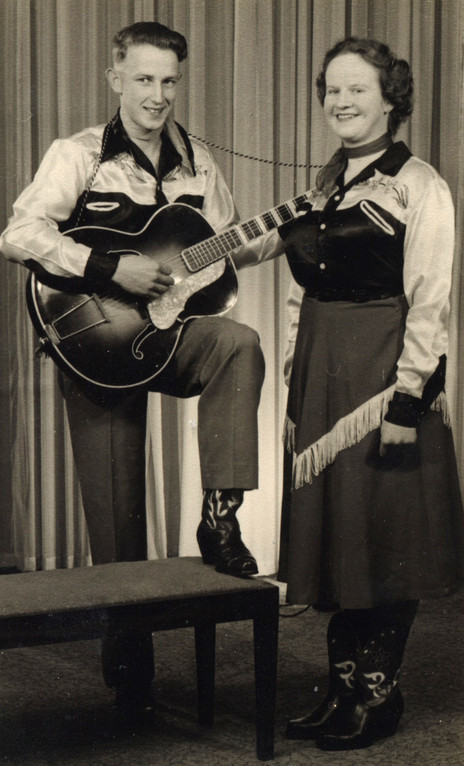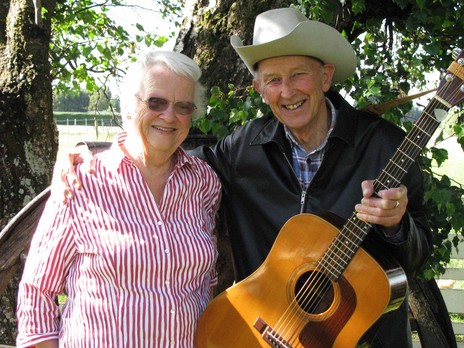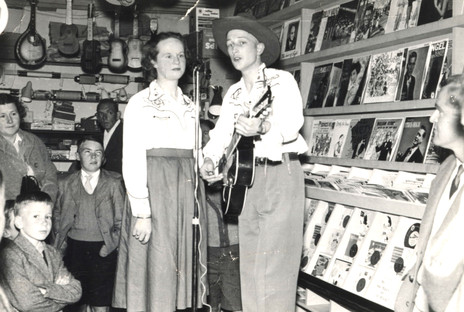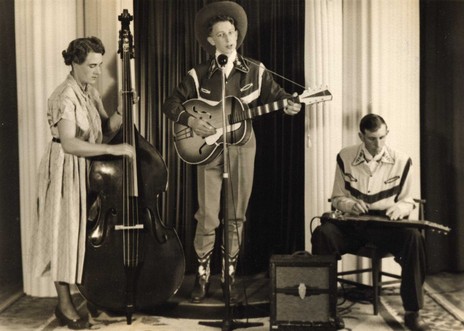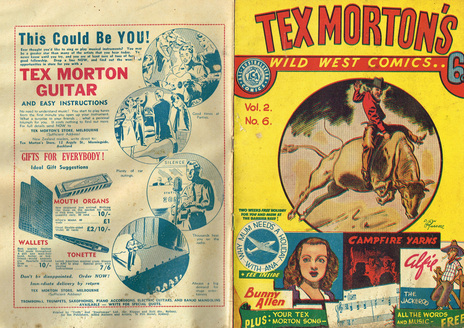He was 12 when he first performed in public. “I sang ‘Silent Night’ unaccompanied, in church, at a Salvation Army Sunday School day, and that would have been 1947. The following Sunday, I was lucky enough to have a pianist accompany me, which must have improved my performance no end!”
After leaving school Franklin became a farm labourer, and his digs had a gramophone with some 78s by Gene Autry and British music-hall cowboy Harry Torrani. “I learnt those songs and I used to get up on the hills of the farm and yodel my head off,” he recalled. “I had my own pony that I used to work on the farm; I used to imagine myself as a real cowboy.”
With his first pay packet Franklin bought a mail-order Tex Morton guitar and soon entered a talent quest in Dannevirke.
With his first pay packet Franklin bought a mail-order Tex Morton guitar and soon entered a talent quest in Dannevirke. Although he didn’t get placed, Franklin was on his way to becoming an acclaimed second-wave pioneer of New Zealand country music. Although Tex Morton in the 1930s and, in the late 1940s, Les Wilson (brother of Cole Wilson from The Tumbleweeds) wrote many original songs, by the time Franklin emerged in the mid-1950s, it was more typical for country and western performers to concentrate on cover versions of US standards. But Franklin wrote much of his own material, including a statement of purpose, ‘A Real New Zealand Cowboy Song’ – and his work would eventually receive the honour of being anthologised on CD by the esteemed Bear Family Records label of Germany.
Despite not coming anywhere at that early Dannevirke talent quest, the event was pivotal in his career. He met Horace and Tui Hartley, who had their own group, and they asked Franklin to be their vocalist. As the Ruahine Ramblers – Horace on steel guitar, Tui on piano and bass – they made their debut on 7 January 1954, singing to a crowd waiting for the arrival of a train carrying Queen Elizabeth on her first visit to New Zealand.
A month later, the Ramblers broadcast live-to-air on 2ZA. From then on, offers to perform flowed in from organisers of dances, concerts and radio shows from Wanganui to Hawke’s Bay. Auditioning for Tanza on 20 January 1955, they recorded seven tracks at a provincial studio, including Jimmie Rodgers’ ‘When The Cactus Is in Bloom’, but were unsuccessful.
After 18 months with the Ruahine Ramblers, Rex Franklin met a young woman at a talent quest in Palmerston North. And so began one of the great romances of New Zealand country music.
Noelene Anderson grew up in the Manawatu district, on the opposite side of the Ruahine Ranges from Franklin, and was just as interested in country music. The Manawatu Gorge proved no obstacle and the pair began “courting and singing together” in 1955. For their first performance, at Ormondville on 25 November, they called themselves the Sun Valley Trail Singers. They began broadcasting on local stations, and performed around the central North Island, and in Gore, Dunedin and Timaru.
In August 1956 Franklin travelled to Wellington for the first time, and made a pitch to Murdoch Riley, the new A&R man at Tanza Records. Riley liked what he heard, and asked Ivan Tidswell of Dannevirke to record the duo. The first of several Tanza sessions took place at Tidswell’s home a month later. Four songs were recorded, two made popular by Hank Snow, and two Franklin originals. ‘Oh Why Can’t You Say?’ was his first effort at songwriting, while the exuberant ‘Rocky Mountain Lullaby’ remained in their repertoire for years:
Cowgirls swayin’, guitars playin’, I can hear those girls a sayin’
Rocky Mountain Lullaby ...
They’re dancing for the joy of life, if you don’t believe me, ask my wife
’bout the Rocky Mountain Lullaby …
Although the Franklins recorded many country standards, Rex wrote songs that emphasised his own background rather than a borrowed fantasy.
Although the Franklins recorded many country standards, Rex wrote songs that emphasised his own background rather than a borrowed fantasy. ‘On the Takapau Plains’ described the small farm the family rented in Takapau for nine years while he worked at the telephone exchange. “It was very quiet, with tui and night owls, horses and cows, and our own chooks,” recalled Franklin. “I used to catch possums. It was a really country atmosphere, which I wrote about.”
The duo’s style was already intact: Rex’s brisk, emphatic low-string picking, Noelene with the penetrating tone of the Carter Family. She ends each line with a hint of vibrato, but never launches into a yodel (her sister was the yodeller in the family). All that separates these debut recordings from their later work is a lift in confidence: in their performance and Tidswell’s engineering.
Two months after those early Dannevirke sessions, Noelene and Rex got married – and hit the road to promote their first Tanza release. The couple organised Western Variety Shows around Manawatu, made live broadcasts on 2ZA, and visited the radio stations of the central North Island.
“We camped out at the side of the road between Taupo and Palmerston North, somewhere along the highway by the forest,” said Franklin. “We pitched a tent, and when we woke up in the morning we could hardly talk. There was a bit of a chill. So when it came to broadcast that afternoon, we got our voices back just in time.”
At the end of the 1960s, the Franklins appeared with Tex Morton on The Country Touch NZBC television show, alongside other local artists such as the Hamilton County Bluegrass Band, Malcolm Marshall, Max McCauley, and Dusty Spittle.
The Franklins’ discography is extensive, and began with 78rpm discs for Tanza in 1957. As Rex and Noelene Anderson, their first release was ‘Would You Mind’ b/w ‘Wonder Where You Are Tonight?’. Rex’s own ‘Rocky Mountain Lullaby’ was the A-side of the follow-up. Most of their recordings were on Viking, which Murdoch Riley founded after leaving Tanza.
In the vinyl era, there were many EPs, such as Drover’s Dream and Fraulein and Other Country Hits, and about nine LPs, including their debut 1000 Miles Out Yonder in 1961 and The Redback On The Toilet Seat in 1973. As the Sun Valley Trail Singers, Rex and Noelene released the EPs The Shearer’s Jamboree and Serenading in the Evening, both on Viking in 1960. Franklin also released many new albums and retrospective compilations on CD.
In 1999 the Bear Family’s anthologies of the Franklins’ early recordings were released on two CDs, A Real New Zealand Cowboy Song and Upon The Outlaw Trail. On the label’s roster this placed them alongside legends such as the Carter Family, Hank Snow and Roy Acuff. “Right from the word go, I wanted to sing and play my guitar on radio,” said Franklin. He demurred about contemporary country music. “We sing traditional country,” he said. “It’s the real thing.”
The international attention generated by the Bear Family compilations was gratifying, but Franklin also treasured the day in 1980 he spent in North Sydney with his hero, Tex Morton. “I took the ferry over, had a feed of prawns and a beer in his favourite hotel in Manly. He showed me some little aluminium discs he’d made in about 1936. He said these were played with a bamboo needle. He recorded them just for local broadcasting use, and said there were about 16 of them.” Three years later, Franklin was the sole country music representative at Morton’s memorial service in Nelson. “I was the only member there outside the family. It was quite an honour.”
That mail-order guitar endorsed by Morton obviously paid off, for Franklin enjoyed a long life sharing his love of country music. And so did the romance with Noelene. Their marriage lasted 60 years, and the duo was still performing together until shortly before his death on 8 January 2016, aged 80.
